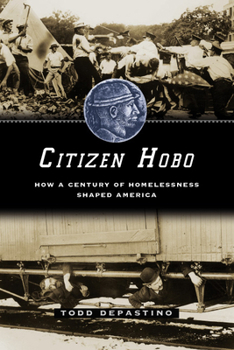Citizen Hobo: How a Century of Homelessness Shaped America
Select Format
Select Condition 
Book Overview
In the years following the Civil War, a veritable army of homeless men swept across America, forging a counterculture known as hobohemia. This work tells the epic story of hobohemia, drawing a new interpretation of the American century in the process.
Format:Hardcover
Language:English
ISBN:0226143783
ISBN13:9780226143781
Release Date:September 2003
Publisher:University of Chicago Press
Length:350 Pages
Weight:1.40 lbs.
Dimensions:1.0" x 6.1" x 9.3"
Customer Reviews
2 ratings
Great on Book TV, Better in Print
Published by Thriftbooks.com User , 20 years ago
I saw this author on C-Span's Book TV and was captivated by the way he described the homeless "hobohemia" counterculture of the early 20th century. The excerpts he read and the enthusiasm he conveyed for his subject convinced me that this would be a book worth buying. As I soon found out, and as another reviewer has said, "Citizen Hobo" is so much more than a history of homelessness. It is a "tour-de-force," a historical pageant that compresses what the author said was 10 years of research into a little over 300 pages. "Citizen Hobo" tells a great epic. After the Civil War, large-scale changes in the economy put millions of "tramps" on the road in seach of work. These men eventually created their own culture that DePastino calls "hobohemia." While many Americans romanticized hobohemia and even embraced the hobo life as a liberation from the "rat race" of capitalism, government officials and politicians like Franklin Roosevelt tried to figure out ways to get hoboes to settle down. During the Great Depression and World War II period, these leaders created new welfare programs and forms of prefential treatment intended to encourage white men to get married, buy a house, have kids, and conform to the "American way of life." (After reading this book, you will never think of Roosevelt's New Deal or the GI Bill in the same way again!) These programs poured so much money into suburban cookie-cutter homes during the 1950s and 1960s that little was left over for apartments and lower-cost housing in the city, a failure that contributed to the homelessness crisis of the last twenty years.This is just the bare outline of a story which is so richly textured and multi-dimensional that the reader can get lost in the fascinating details. But DePastino knows just when to pull the reader back and show the big picture again. His writing is beautiful and elegant, not a zippy read that can be dispensed with quickly, but a deep and thoughtful narrative with lots of great anecdotes and analyses along the way. His examinations of Jack Kerouac's "On the Road" and "Dharma Bums" are masterful, as are the stories he tells about Walt Whitman, Jack London, Charlie Chaplin, Woody Guthrie, Bill Mauldin, and many others. Although DePastino covers the economic and policy angles on the problem, his first love is obviously culture, especially literature, music, and movies. While the other reviewer wanted to run out and listen to Guthrie, Dylan, and Springsteen after reading the book, I wanted to watch the movies that "Citizen Hobo" discusses, like "Modern Times," "Sullivan's Travels," and "Easy Rider."DePastino is convinced, and he has convinced me, that homelessness is woven into the fabric of American life and that to address homelessness means changing, yet again, the rights of American citizenship.This is a great book. Let's hope we don't have to wait 10 years for another from this author!
Giving Voice to the American Experience of Homelessness
Published by Thriftbooks.com User , 20 years ago
When I finished Mystery Train and Ranters & Crowd Pleasers by Greil Marcus, I found myself dazzled by the breadth of the author's knowledge and his ability to connect ideas. I also wanted to run to my shelves of CDs and albums to re-examine Marcus's primary sources, to hear the music I already knew in dynamic new contexts. I was no less creatively and intellectually energized by Todd DePastino's Citizen Hobo. DePastino's subject is American homelessness, not the cultural gravity of pop music a la Marcus. Citizen Hobo, though, is quick to view the issue not only through traditional scholarship, but also through literature, dime store novels, letters, the underground press and songs, material that brings DePastino's stories to life. By the time I finished Citizen Hobo I wanted to re-read On the Road and The 42nd Parallel, dive into some Whitman and Frost and burn my own CD compilation of songs about hoboes and home, spinning off from Springsteen, Dylan and Guthrie. I offer that as high praise. As for the primary theme of DePastino's work, it's not easily summarized. Make no mistake that this is a rich, academic text that assumes a strong understanding of post-Civil War American history and political ideologies. Still, the narrative is crisp, engaging and eminently readable. Citizen Hobo traces the metamorphosis of hoboes from white men who followed the roads to work in the late 1800s to the modern men and women of various backgrounds who have become both homeless and "houseless." In doing so, DePastino delves into American racism and sexism, the failures and successes of capitalism in providing genuine opportunities for all, public perceptions versus the realities of homelessness, and the politicizing and artistic celebrations of "hobohemia." If there's one overarching idea it's that American notions about the homeless have too often been oversimplified, ideologically charged or based on erroneous information. Citizen Hobo gives individuals back their various unique and compelling voices by presenting the subject of homelessness in all its complexity. I'd go on, but I'm distracted by thinking about which of Lou Reed's New York songs better represents DePastino's depiction of 1980s homelessness - "Dirty Boulevard" or "Xmas in February." Read Citizen Hobo and prepare to be inspired to rethink your own perceptions of the homeless and re-explore your own touchstones of the American experience.





